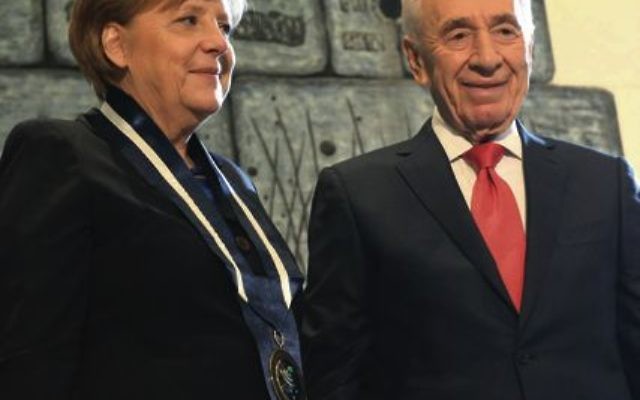Merkel feted in Israel
Germany’s chancellor Angela Merkel received one of the State of Israel’s highest honours on Tuesday.
Israel’s President Shimon Peres awarded her with the Presidential Medal of Distinction at a Jerusalem ceremony. “Your commitment to Israel’s security and to the cause of peace is set in stone,” he declared. “You oversaw the expansion of our economic ties, the deepening of scientific collaboration and never hesitated to provide us with the tools necessary for our defence.”
Merkel was in Israel with most of her cabinet, for two days of joint consultations with the Israeli government. The ceremony at Peres’ residence was one of the more relaxed moments in a visit that came at a challenging time for Israel-Germany relations.
There are tensions between Israel and the European Union over the economic sanctions against settlements which some EU members favour, and some friction with Germany specifically. Germany’s Foreign Minister Frank-Walter Steinmeier offended some Israelis this week by saying that Germans “don’t just consider decisions to expand settlements as unhelpful, but as disruptive of peace efforts.”
During this week’s visit Merkel did not mince her words on settlements. “We are concerned about the settlements,” she said at a joint press conference with Israeli Prime Minister Benjamin Netanyahu. “We do not always see eye to eye on this issue, and I hope that we can overcome these difficulties and that there will be no obstacles to the two-state solution.” But she tried hard to also give reassurance and build bridges.
She said that the decision to bring a large government delegation was intended to show Israelis “that this is indeed a very strong friendship, which ties our two countries together, and a friendship that we want to continue to develop further.”
And she stated that Germany would oppose calls for an EU boycott of settlements. “We do not support the demands for a boycott,” she said.
“This is not an option for Germany.”
On Iran, she showed solidarity with Israel’s concerns, but not its strategy for dealing with them. She called Iran’s nuclear program “not just as a threat for the State of Israel but as a general threat for Europe as well,” but acknowledged a difference of opinion between Germany and Israel. She showed cautious optimism for negotiations between the West and Iran and indicated that she expects some low-level enrichment by Iran to continue under a possible deal, which could act as a “kind of shield” against nuclear armament. Netanyahu said that he thinks allowing any enrichment to continue is “a mistake.”
As well as focusing on the current diplomatic agenda, Israeli and Palestinian ministers started discussing how to mark the 50th anniversary
of the establishment of German-Israeli diplomatic relations, which falls next year.
Netanyahu gave an upbeat assessment of the relationship. “I think our ties provide an example of how, despite the horrors of the past that we can never forget, we strive for – our two peoples strive to transform our relationship into a unique and constructive friendship,” he said. “And I think that the example of Israel and Germany offers hope for the entire world. It shows how we can transform history and make the world a better place to live in – better and I have to say safer and more prosperous.”
NATHAN JEFFAY


comments